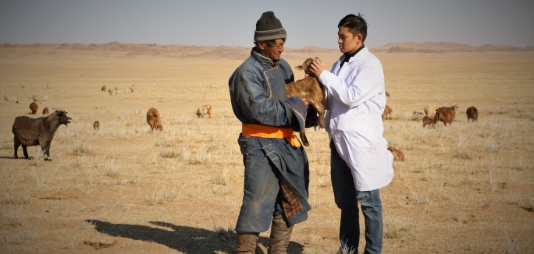ARTICLE
Better data
for better animal health
Reliable data supports national authorities and the international community in making evidence-based decisions to improve global health security. The OIE is spearheading innovative projects to make data related to animal health accessible for everyone.
Leading a revolution on animal health data
The digital revolution that has swept the globe during the last few decades has offered an unprecedented number of opportunities to improve animal health system sustainability. From farmers to Veterinary Services, all actors involved in these systems rely on solid animal health data to manage risks and make everyday choices, sometimes in adverse economic environments. As part of the One Health approach, this data can also trigger responses from the public health sector, or others, to ensure early disease detection and the efficient prevention of global health risks.
To harness new technologies for the benefit of all countries, the World Organisation for Animal Health (OIE) is leading a digital transformation for data management and analysis. 2020 was marked by the achievement of several milestones underpinned by innovation and technology. In the upcoming years, the OIE will continue the journey toward a better governance of global animal health data, improving its accessibility and innovative use to tackle the challenges that lie ahead.
OIE-WAHIS: A new era in animal health data systems
Collecting, verifying and sharing data on animal diseases has been at the core of the OIE’s mission since its creation in 1924. The World Animal Health Information System (OIE-WAHIS), used to report and track animal disease outbreaks, has worldwide recognition as the leading source of high-quality, reliable and official information on animal health.
In 2020, WAHIS was upgraded to a more powerful, efficient, and user-friendly platform, and launched in 2021. To better support countries in taking ownership of the new platform and ensure its optimal use, more than 190 staff from Veterinary Services worldwide were trained before its release.
The data on OIE-WAHIS is accessible to everyone from the online platform or mobile app, allowing timely and efficient responses to transboundary and high-impact animal diseases, many of which have zoonotic potential. Government agencies, trade partners, industry, researchers and journalists can easily follow the evolution of outbreaks worldwide. The new user-friendly interface allows data to be viewed and extracted in different formats, making its analysis even more powerful and practical.
Combatting antimicrobial resistance with data
In addition to animal health data, the OIE has also been collecting information on the use of antimicrobials (AMU) in animals since 2015. This database is a key component of our strategy to limit the emergence of antimicrobial resistance (AMR), one of today’s most urgent global health threats.
To facilitate access to this crucial and growing set of information, the OIE database will be digitalised in the coming year, thanks to the financial support of the UK Government Fleming Fund. By facilitating national, regional and global monitoring of the AMU over time, this centralised data system will help countries optimise the use of antimicrobials and is poised to become a cornerstone in our global fight against AMR.
Monitoring the implementation of OIE International Standards
The development of international standards for animal health and welfare is another central mission of the OIE. Yet, these recommendations can only be effective if they are put to use.
Acknowledging that many Members face challenges in the implementation of these standards, the World Organisation for Animal Health also monitors how effectively they are used across the world. Its new mechanism to do so: the OIE Observatory.
Building on a study of the Organisation for Economic Co-operation and Development (OECD) published in February 2020, the ongoing pilot phase of the project will help create the framework needed to collect and analyse relevant data from Members. By evaluating how OIE International Standards are implemented, we will be in a better position to understand challenges faced by countries and find tailored solutions. Ultimately, this data will provide solid foundation to build a common language among countries in order to tackle global challenges.
The OIE Observatory is a continuous and systematic mechanism to observe and analyse Members’ practices in the implementation of OIE International Standards.
Quantifying the global burden of animal diseases on human well-being
While hundreds of millions of dollars are invested globally every year on preventing livestock diseases, a systematic way to determine their socioeconomic impact is not yet available. Decision makers still have no means to know how their investments in animal health affect human well-being and their livelihoods. This is why the OIE, in partnership with the University of Liverpool and a consortium of international organisations and universities, will study the impact of animal diseases through the lens of economics and human well-being.
The Global Burden of Animal Diseases (GBADs) programme will help identify the individuals and communities which are the most affected, demonstrating how animal health is intrinsically linked to small household income, the empowerment of women and the equitable provision of a safe, affordable and nutritious diet. The programme will act as an essential tool in linking existing animal disease data to their socioeconomic consequences.
By facilitating a more comprehensive analysis, the information provided by GBADs will guide public policy and private sector strategy, contributing to the improvement of animal health and welfare.

